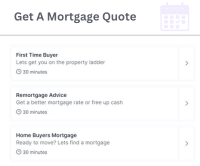lifetime mortgage advisor
Release equity in your home
Lifetime mortgages can often leave you feeling overwhelmed. However, with the right guidance, you can make the right decisions to release a portion of the equity in your home without selling it.
- Rated as excellent
- 4.98/5
A Lifetime Mortgage is not suitable for everyone and may affect your entitlement to means tested benefits, so it is important to seek financial advice before taking any action. If you are considering releasing equity from your home, you should consider all options available before equity release. The interest that may be accrued over the long term with a Lifetime Mortgage, may mean it is not the cheapest solution. As interest is charged on both the original loan and the interest that has been added, the amount you owe will increase over time, reducing the equity left in your home and the value of any inheritance, potentially to nothing.
Although the final decision is yours, you are encouraged to discuss your plans with your family and beneficiaries, as a Lifetime Mortgage could have an impact on any potential inheritance. We would also encourage you to invite them to join any meetings with your Financial Advisor so they can ask questions and join in the decision, as we believe it is better to discuss your decision with them before you go ahead.
Why choose us
Your home, your future. Our advice
If you're over 55 and thinking of releasing equity in your home then let us handle the mortgage search, application, and everything in between.
Save Time
Don’t waste your valuable time researching lifetime mortgage rates and completing lengthy application forms. We’ll take care of it for you.
Save Money
Save money on your mortgage with better rates and lower application fees, it could mean big savings on your monthly payments.
Get Exclusive Rates
Your lifetime mortgage advisor has access to 1000’s of mortgage rates and exclusive offers that that may not be available to you directly.
lifetime mortgage advice
What should you know
While a lifetime mortgage can offer financial benefits, it's crucial to carefully consider the potential drawbacks and consult with a financial advisor to ensure it's the right choice for your circumstances
To apply for a lifetime mortgage, all applicants must be at least the minimum age set by your provider (typically over 55) and the property must be your main residence.
You can continue to live in your home, and the loan and interest are paid back when you sell your home, move into care, or pass away
What can I borrow
The amount you can borrow on a lifetime mortgage is based on your age and the value of your property. The loan-to-value ratio (LTV) is the maximum percentage the lender can lend on your property. Most people end up with an LTV of between 20% and 50%

Do I qualify?
A lifetime mortgage is available to homeowners aged 55 and above. Your home must generally be worth £70,000 or more, although specific lender requirements may differ.

Do I make payments
If you want to yes, but unless you opt for voluntary repayments, you won't make monthly payments. Interest will accumulate over time, your debt will never exceed the property's value

Who's it for?
A lifetime mortgage can be a good option if you're over 55 and need a lump sum of cash for various purposes, such as home improvements, debt consolidation or funding retirement living expenses.

lifetime mortgage advisors
What we do for you
Unlock your home's potential with our expert home equity release advice. We will:
-
Assess your needs: Understand your financial goals and future plans to determine if a lifetime mortgage is the right choice for you
-
Explain the process Help you understand lifetime mortgages, including how interest is calculated, how the loan is repaid, and costs.
-
Compare lenders: Research and compare different lenders to find the most suitable options based on your specific needs and budget.


how to get a mortgage
Chat to a advisor
Advice whenever you need it
You can get expert lifetime mortgage advice, from 8am - 8pm Monday to Friday.
lifetime mortgage help
Your mortgage questions
A lifetime mortgage allows homeowners aged 55 or over to access equity from their property without selling it. The loan is typically repaid upon the death of the last surviving homeowner or when the property is sold.
Generally, you must be aged 55 or over and own a property in the UK. The property must meet certain minimum value requirements set by the lender. Typically this is £70,000.
You receive a lump sum or regular payments from the lender. The interest on the loan is typically rolled up, meaning it's added to the principal balance. You don't have to make monthly repayments while you live in the property.
The loan is repaid when the property is sold or when the last surviving homeowner dies.
The main cost is the interest on the lifetime mortgage loan. The interest rate can vary depending on the lender and your circumstances. There may also be arrangement fees, and valuation costs.
Some mortgage lenders allow you to make voluntary repayments to reduce the total amount owed. However, there may be restrictions or early repayment charges, your lifetime mortgage adviser can inform you of any charges before proceeding.
YOUR HOME OR PROPERTY MAY BE REPOSSESSED IF YOU DO NOT KEEP UP REPAYMENTS ON YOUR MORTGAGE.
